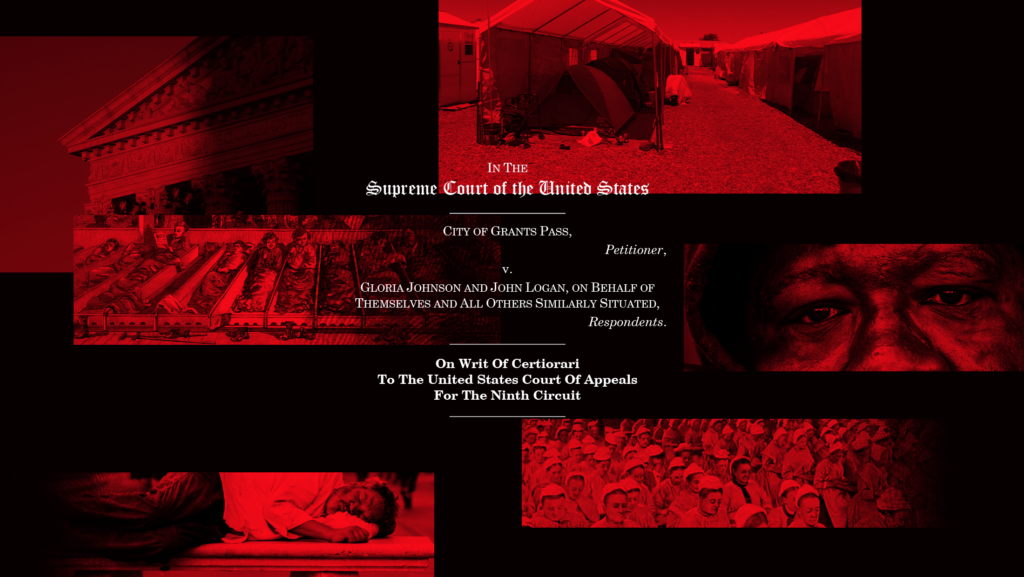The Supreme Court Homelessness Case Threatens Our Basic Humanity

Is homelessness, in and of itself, a crime? That is the question that has risen to the highest levels of our judicial system. And sadly, the same forces that told you the government shouldn’t be able to force you to buy health care seem poised to say every person must have a landlord — or face imprisonment.
The U.S. Supreme Court recently heard oral arguments in the case City of Grants Pass, Oregon v. Johnson, in which the city of Grants Pass enacted an ordinance making it a crime for unhoused people to camp on public property. Grants Pass’s law is particularly insidious. While it purports to prohibit “camping” on public land, its reach is broader. In effect, anyone sleeping in a public place with so much as a makeshift blanket, pillow or even piece of cardboard will be in violation of the law. Given that every human being must eventually sleep, the law bans homelessness.
Rather swiftly, the 9th U.S. Circuit Court of Appeals held that punishing people for having nowhere else to go constitutes “cruel and unusual punishment” under the 8th Amendment. The judges relied on two compelling facts: First, the only shelter in the city is privately run by a Christian nonprofit, which not only doesn’t have nearly enough beds for the city’s estimated 1,200 unhoused people, but also has strict rules that are a barrier for many. Second, the city has tried to actually create solutions that will help the city’s unhoused residents but the housed residents complain in “NIMBY” fashion and prevent any progress from happening — raising potential equal protection concerns for disfavored groups.
Reading that opinion, we’re reminded: “Speak to history and it shall teach thee.”
If the question is whether cities like Grants Pass are engaging in “cruel and unusual” behavior, this should be an open-and-shut case.
We have criminalized homelessness before. Poorhouses existed in this nation well into the 20th century, punishing people for the same reasons as Grants Pass: for lacking the means to support food, clothing and shelter. According to the dictates of the time, punishing people for being “dependent” would disincentivize people from being poor — essentially combining anti-poverty stigma with the capitalist myth that anyone can lift themselves up with their own bootstraps. But that never worked. All that these facilities and their squalid conditions produced was ever-greater misery and despair while trampling the constitutional rights of those without shelter.
Our website and flagship newsletters are free for all thanks to contributions from our readers. Consider supporting Democracy Docket’s work and keeping our content free by becoming a member for $120/year.
That experience should be instructive and lead the Court to affirm the 9th Circuit’s holding. But predictably, the conservative majority wants a free pass to repeat our errors and inflict new harm. Chief Justice John Roberts, in particular, was desperate to find a way to fault unhoused individuals for their own circumstances, suggesting there must be some “choice” they made that left them homeless. He even compared them to bank robbers, engaging in a rather soulless bout of victim-blaming.
In the Chief’s approach, you could hear echoes of the worst pseudoscience on homelessness. Take for example Judge Glock, a researcher at the notoriously conservative Manhattan Institute, who told USA Today that Grants Pass’s law is important because “these encampments are an incredible danger to the homeless themselves.” So dangerous that it would be better to have the state use armed force to imprison them?
While there is no “silver bullet” for solving homelessness, every effective solution has focused on how to actually help unhoused people out of their current situation. Helping them find shelter for more than just a night at a time and providing other forms of support is key to creating the stability they need to escape their current circumstances. Punishment just creates a vicious cycle leading to more homelessness and, in Grants Pass, more punishment.
So, if the question is whether cities like Grants Pass are engaging in “cruel and unusual” behavior, this should be an open-and-shut case. But for the Court, nothing is ever as it should be.
Rakim Brooks is a public interest appellate lawyer and the president of Alliance for Justice. As a contributor to Democracy Docket, Brooks writes about issues relating to our state and federal courts as well as reforms to our judicial systems.